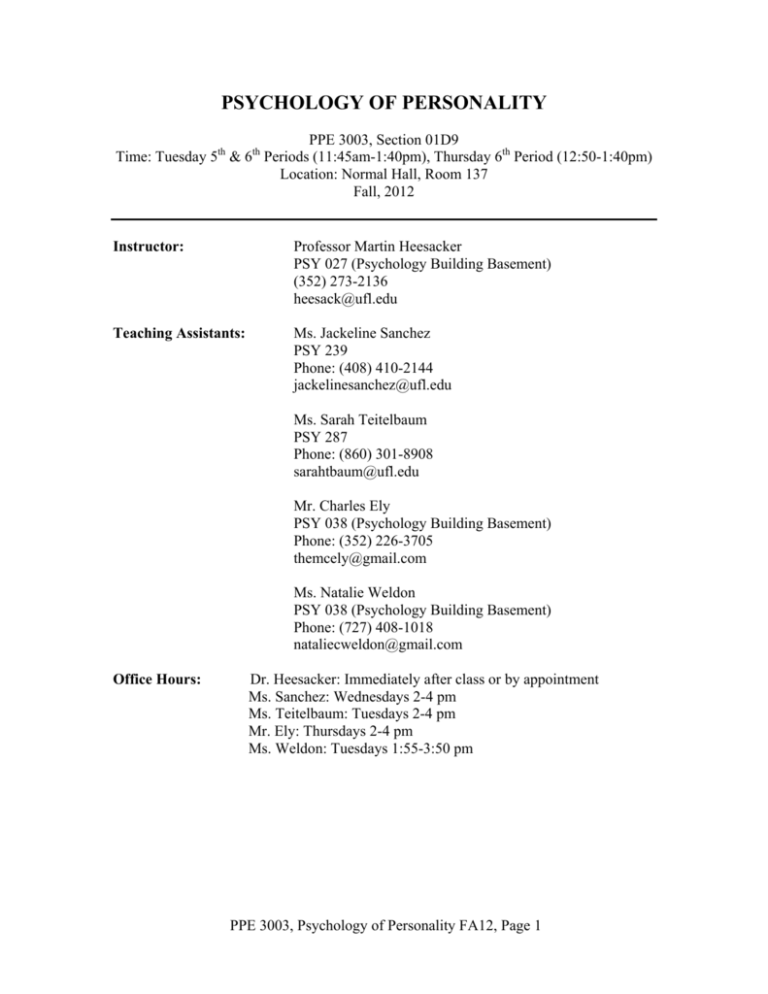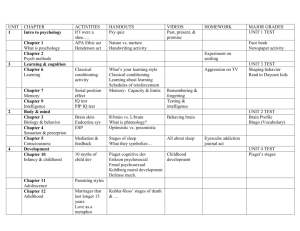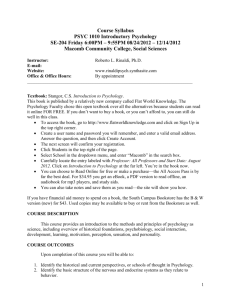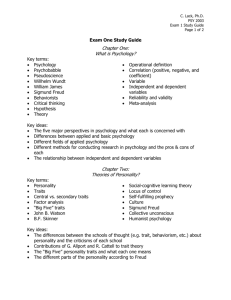PSYCHOLOGY OF PERSONALITY
advertisement

PSYCHOLOGY OF PERSONALITY PPE 3003, Section 01D9 Time: Tuesday 5 & 6 Periods (11:45am-1:40pm), Thursday 6th Period (12:50-1:40pm) Location: Normal Hall, Room 137 Fall, 2012 th th Instructor: Professor Martin Heesacker PSY 027 (Psychology Building Basement) (352) 273-2136 heesack@ufl.edu Teaching Assistants: Ms. Jackeline Sanchez PSY 239 Phone: (408) 410-2144 jackelinesanchez@ufl.edu Ms. Sarah Teitelbaum PSY 287 Phone: (860) 301-8908 sarahtbaum@ufl.edu Mr. Charles Ely PSY 038 (Psychology Building Basement) Phone: (352) 226-3705 themcely@gmail.com Ms. Natalie Weldon PSY 038 (Psychology Building Basement) Phone: (727) 408-1018 nataliecweldon@gmail.com Office Hours: Dr. Heesacker: Immediately after class or by appointment Ms. Sanchez: Wednesdays 2-4 pm Ms. Teitelbaum: Tuesdays 2-4 pm Mr. Ely: Thursdays 2-4 pm Ms. Weldon: Tuesdays 1:55-3:50 pm PPE 3003, Psychology of Personality FA12, Page 1 Required Materials: Friedman, H. S., & Schustack, M. W. (2012). Personality: Classic theories and modern research (5th Ed.). New York: Allyn & Bacon. ISBN: 0205050174 Schustack, M. W. & Friedman, H. S. (2007). The Personality Reader (2nd Ed.). New York: Allyn & Bacon. ISBN: 0205485510 The text, reader, and access to online study materials are available altogether in a shrink wrapped package, at approximately $40 discount. That is the ISBN listed for the course. Course Description: Welcome! Personality Psychology is the scientific study of the psychological forces that make people uniquely themselves. It is a broad sub-discipline that involves various topics including: the importance of the unconscious, the role of the self, nomothetic versus idiographic approaches, gender differences, the power of the situation, and cultural influences. Topics covered in class will have relevance to students’ daily lives. This course is designed to help broaden students’ knowledge and understanding of the field of Personality Psychology. The course is designed to be challenging, but also interesting and fun. Course Objectives: In this class, students will: 1. Acquire basic knowledge of personality psychology through both primary and secondary sources, and will learn relevant terms, facts, concepts, and theories, including Psychoanalytic, Neo-Analytic/Ego, Biological, Behaviorist, Cognitive, Trait, Humanistic, and Interactionist theories. 2. Improve their higher-order thinking skills, including: (a) critical thinking 3. about human nature, (b) evaluating theoretical assumptions, theories, and research, and (c) distinguishing between fact and opinion. 4. Understand how personality psychology relates to important issues in their lives. E-Learning System Materials and Procedures Class power points, exam study guides, additional readings, grades, and other important materials can be accessed on course website in the E-Learning System: http://lss.at.ufl.edu/. It is a good idea to visit the course site before each class, to receive updates/announcements, such as grade postings and any schedule changes. All PPE 3003, Psychology of Personality FA12, Page 2 email correspondence with the instructor and teaching assistant must occur through via their personal email addresses that are listed above, NOT through the course website. Exams and Extra Credit: Exams (Total = 150 points) There will be THREE NON-CUMULATIVE MULTIPLE CHOICE regular exams worth 50 points each (50 questions, 1 point each). Questions for exams will come from lectures, PowerPoint slides, and the Friedman & Schustack text and Reader. Individuals who arrive for an exam after the first person has turned in his or her answers, will not be permitted to take the exam. Students who are late for an exam will be given no extra time. Students must bring their GATOR ID cards to all exams as proof of identification. Please see the course schedule below for exam dates. Optional Make-Up Exam to Make Up for Any and All Missed Exams There will be no make-ups for regular exams. Instead, students who miss hourly exams can take the optional make-up exam to make up any and all exam(s) they have missed. This optional make-up exam will be cumulative. A student’s score on the optional make-up exam will be substituted for his or her missing regular exam score(s), but not for a lower test score on an hourly exam. All students must bring their GATOR ID cards to the make-up exam. The course schedule below gives the hourly and make-up exam dates. Extra Credit In-Class Activities (Total = Up to 10 points) It is in the student’s best interest to attend class because exams will be based partially on lectures. There will be approximately 10 in-class extra-credit activities of 1 point each. The purpose of these activities is for students to relate psychological concepts learned in this class to personal experiences. In-class activities are administered and then generally due in the same class. STUDENTS MUST BE IN CLASS TO RECEIVE CLASS EXTRA-CREDIT ACTIVITY POINTS. Research Participation Extra Credit (Total = Up to 5 points): Extra credit for psychological research participation may be able to be earned in addition to points earned on exams and class activities. Throughout the semester, there may be a few opportunities for students to participate in research projects usually outside of class, but sometimes in class. Each research participation is worth 1 extra-credit point. All of these must be pre-approved by the course instructor. Extra credit will not be granted for participation in research projects that have not been pre-approved. Students or research investigators must provide the instructor with written documentation of student participation in the research study in order to receive any extra credit. Grading: Grades will be based on scores on three non-cumulative multiple-choice exams (a possible total of 150 points) and/or students’ scores on the optional final exam, plus any extra-credit points they might accrue from the Extra-Credit In-Class Activities (maximum 10 points), and any earned Research Participation Extra Credits (maximum 5 points). Thus, the total possible number of grade points is 150 (plus extra credit). The grading scale for these 150 possible points is as follows: Grade A Percentage Total Points > 92% 138-150+ PPE 3003, Psychology of Personality FA12, Page 3 AB+ B BC+ C CD+ D DE 90%-91% 88%-89% 82%-87% 80%-81% 78%-79% 72%-77% 70%-71% 68%-69% 62%-67% 60%-61% < 59% 135-137 132-134 123-131 120-122 117-119 108-116 105-107 102-104 93-101 90-92 89 and below Contacting the Instructor and Teaching Assistant The best way to contact the instructor and teaching assistants is via their email addresses. Please do not use ELearning to send email. The instructor and TAs do not monitor that email. You may also contact the instructors or TAs by phone. The instructor has a mailbox in PSY 114, as well. In general, e-mail messages will be responded to within 48 hours. General Policies Please turn off all cell phones, pagers, or any other electronic devices that may be distracting during class. If cell phones ring in class, the instructor reserves the right to answer your phone on your behalf! Please refrain from private discussions with classmates, as well. If you chose to read or browse your laptop or phone during lectures, please inform the instructor after class of any particularly interesting material you discover! On the other hand, please refrain from asking questions that were already answered in the syllabus or during a time you were not paying attention! During class, please ask questions about concepts that are unclear or share examples that are relevant to the lecture. Power Point slides from the lectures will be available on E-Learning. If you miss class, please be sure to speak with another student in the class so that you can catch up on lecture notes/class materials. Beyond the Power Point slides, the instructor and TAs WILL NOT PROVIDE CLASS NOTES TO ANY STUDENTS and office hours will not be used to conduct mini-versions of missed lectures. Office hours are available to answer specific questions and review grades. Academic Honesty Cheating is NOT tolerated at UF. Cheating is defined in the UF Handbook, and it is the student’s responsibility to be familiar with its many forms (including plagiarism). If a student is caught cheating, the first offense will result in a zero for that exam or paper and a record of the event will be placed in a temporary file with the Office of Student Affairs. The second offense will result in an “E” for the course, and the student will go before the Honor Court. As a result of completing registration at UF, every student has agreed to the following statement: “I understand that UF expects its students to be honest in all their academic work. I agree to adhere to this commitment to academic honesty and understand that my failure to comply with this commitment may result in disciplinary action up to and including expulsion from the University.” Students Requiring Accommodations: PPE 3003, Psychology of Personality FA12, Page 4 Students requiring classroom accommodation must first register with the Disability Resource Center in the Dean of Students Office (http://www.dso.ufl.edu/drc/current.php). The Center will provide documentation to the student who must then give this documentation to the instructor when requesting specific accommodations. Students eligible for learning accommodations are encouraged to speak with the instructor and/or TAs as soon as possible, preferably the first day of class, so that arrangements can be made in a timely manner. Planned Course Schedule Week 1 2 Date 8/23 8/28 2 3 3 4 4 5 5 6 8/30 9/4 9/6 9/11 9/13 9/18 9/20 9/25 6 9/27 7 7 8 8 9 9 10 10 11 11 12 10/2 10/4 10/9 10/11 10/16 10/18 10/23 10/25 10/30 11/1 11/6 12 13 13 11/8 11/13 11/15 14 11/20 14 11/22 15 11/27 15 11/29 Topic Reading Overview of Course Chapter 1 How is Personality Studied Chapter 2 and Assessed? Psychoanalytic Theory Chapter 3 Psychoanalytic Theory Readings 1-5 Psychoanalytic Theory -Neo-Analytic/EgoTheory Chapter 4 Neo-Analytic/Ego Theory Readings 6-11 Neo-Analytic/Ego Theory -Biological Theory Chapter 5 Biological Theory Readings 12-20 Study EXAM #1 Chapters 1-5, Readings 1-20 Behaviorist Theory Chapter 6 Behaviorist Theory Readings 21-24 Cognitive Theory Chapter 7 Cognitive Theory Readings 25-29 Cognitive Theory Trait & Skill Theory Chapter 8 Trait & Skill Theory Readings 30-33 Humanistic Theory Chapter 9 Humanistic Theory Reading 34-40 Interactionist Theory Chapter 10 EXAM #2 Chapters 6-9, Readings 21-40 Interactionist Theory Readings 41-44 Male-Female Differences Chapter 11, Reading 45 Stress, Adjustment, & Chapter 12, Health Reading 46 Culture & Ethnicity Chapter 13, Readings 47-48 NO CLASS: Thanksgiving Love and Hate Chapter 14, Reading 49 Where Will We Find Chapter 15 Personality? PPE 3003, Psychology of Personality FA12, Page 5 16 12/4 EXAM #3 Finals Week 12/13 Thursday MAKE UP FINAL EXAM 3:00-5:00 pm (13D) PPE 3003, Psychology of Personality FA12, Page 6 Chapters 10-15, Readings 41-49 Cumulative







